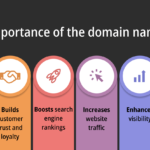Web Hosting for High-Traffic Websites
- By -Daisy
- Posted on
- Posted in Web Hosting
As a website grows in popularity, it’s essential to choose the right web hosting that can handle the increasing traffic and deliver fast, reliable performance. High-traffic websites require a hosting solution that not only offers scalability but also ensures your site remains up and running without issues. In this guide, we’ll explore the best web hosting options for high-traffic websites and how to choose the right plan to meet your needs.

Understanding the Importance of Web Hosting for High-Traffic Websites
When a website experiences a surge in traffic, its web hosting becomes a critical factor in maintaining performance and uptime. Poor hosting can lead to slow loading speeds, site downtime, and even a negative user experience, all of which can harm your website’s credibility and SEO rankings.
For high-traffic websites, the goal is to choose a hosting solution that:
- Scales seamlessly to handle traffic spikes.
- Provides fast loading speeds for users worldwide.
- Offers high reliability with minimal downtime.
- Supports heavy data usage without performance degradation.
Types of Web Hosting for High-Traffic Websites
The right type of hosting for your high-traffic website will depend on various factors such as traffic volume, site complexity, and budget. Below are the most common hosting options suited for websites expecting high levels of traffic.
1. Dedicated Hosting
Dedicated hosting provides the highest level of performance, security, and control. With dedicated hosting, your website has an entire server dedicated exclusively to it. This means you won’t share resources with other websites, and all server power is available for your site alone.
Benefits of Dedicated Hosting:
- Maximum performance: Full control over server resources, ensuring optimal speed and performance.
- Customization: You can configure the server based on your specific needs, installing custom software, and optimizing for traffic.
- High reliability: Your site is less likely to experience performance issues due to resource sharing.
Best for: Large businesses, e-commerce platforms, and websites with massive traffic and complex needs.
2. Virtual Private Server (VPS) Hosting
A VPS is a virtualized server that behaves like a dedicated server within a shared hosting environment. With VPS hosting, you still share the physical server with other users, but you have your own allocated resources (CPU, RAM, and disk space), which ensures better performance than shared hosting.
Benefits of VPS Hosting:
- Scalability: Easily scale resources up or down as traffic fluctuates.
- More control: You have root access to install custom software and configure settings to optimize for your website’s needs.
- Better performance: VPS hosting offers dedicated resources, meaning fewer interruptions from other websites on the same server.
Best for: Medium to large-sized websites, growing businesses, and websites with moderate traffic.
3. Cloud Hosting
Cloud hosting involves hosting your website across multiple servers, typically within a cloud network. This type of hosting is highly flexible, scalable, and resilient. It can handle large spikes in traffic by allocating more resources dynamically based on demand, without any downtime.
Benefits of Cloud Hosting:
- Scalability: Cloud hosting can scale automatically to meet the demands of high traffic without downtime.
- Redundancy: Data is replicated across multiple servers, minimizing the risk of downtime due to server failure.
- Pay-as-you-go pricing: You only pay for the resources you use, making it a cost-effective solution for fluctuating traffic.
Best for: Websites with unpredictable or fluctuating traffic, high-traffic blogs, or large e-commerce websites that need flexibility.
4. Content Delivery Network (CDN)
A CDN is not a hosting type on its own, but it can significantly enhance the performance of your high-traffic website. CDNs work by caching and distributing your website’s content across multiple global servers. When a user accesses your site, the CDN serves content from the server closest to their location, improving loading times and reducing server load.
Benefits of CDN:
- Faster load times: Reduces latency by serving content from geographically distributed servers.
- Reduced server load: Offloads traffic from the main server, helping to prevent bottlenecks during traffic spikes.
- Improved SEO: Faster loading times improve user experience and SEO rankings.
Best for: High-traffic websites with a global audience, particularly those using static content like images, videos, and scripts.
Conclusion
Choosing the right hosting for a high-traffic website is essential for maintaining performance, reliability, and scalability. Whether you opt for dedicated hosting, VPS, cloud hosting, or use a CDN, it’s crucial to select a plan that meets your website’s specific needs and growth potential. By focusing on key factors like scalability, uptime, performance optimization, and security, you can ensure your high-traffic website operates smoothly and provides a positive user experience.



